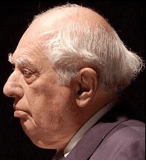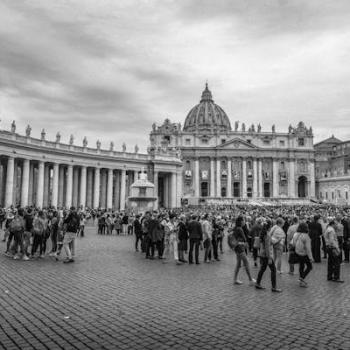By Firas Ahmad - May 18, 2009
 In September of 1990, at the cusp of the fall of the Soviet Union, Bernard Lewis published a seminal essay in the Atlantic Monthly titled "The Roots of Muslim Rage." The essay articulates his theory as to why Islamic civilization is in such disarray and what must be done to fix it. Through a series of subsequent books he argues that Islam's downfall was a result of its inability to modernize, focusing specifically on the relationship between religion and state. His underlying argument, that Muslims are angry because their religion has failed them, and not because of geo-politics, foreign occupation or anything else, provides the intellectual justification for many failed U.S. policies in the Middle East since 9/11.
In September of 1990, at the cusp of the fall of the Soviet Union, Bernard Lewis published a seminal essay in the Atlantic Monthly titled "The Roots of Muslim Rage." The essay articulates his theory as to why Islamic civilization is in such disarray and what must be done to fix it. Through a series of subsequent books he argues that Islam's downfall was a result of its inability to modernize, focusing specifically on the relationship between religion and state. His underlying argument, that Muslims are angry because their religion has failed them, and not because of geo-politics, foreign occupation or anything else, provides the intellectual justification for many failed U.S. policies in the Middle East since 9/11.
Lewis acknowledges the fact that Islam was an integral component of the great civilizational flourishing that took place in the Muslim world during the Middle Ages. He goes on to contend that the bifurcation of religious and secular authority in Europe and North America during the advent of modernity created a world where nations influenced by socio-political Islam were no longer viable. In short, he concludes that what made Islam great, the influence of religion in the public conscience, is what in part led to its eventual downfall.
Lewis goes on to argue in his book The Crisis of Islam that Islam is at a civilizational crossroads, and Muslims have two choices. The first is to "attribute[s] all evil to the abandonment of the divine heritage of Islam and advocate[s] a return to a real or imagined past. The other way is that of secular democracy, best embodied in the Turkish republic founded by Kemal Atatürk." For Lewis, nothing short of a transformation of the Muslim world into the latter would ensure security for America at home.
Lewis' ideas were important because of his eminent status amongst policy makers in Washington immediately after 9/11. His close relationships with neoconservatives like former Vice President Dick Cheney and former Secretary of Defense Donald Rumsfeld are well noted. A 2004 Time magazine profile of Lewis explained that no other scholar had more influence on the decision to wage war in Iraq. The war was a litmus test as to whether Lewis was correct in his diagnosis and prescription for what ails the Muslim world.
The dramatic failure of the Lewisian perspective is best illustrated by comparing the status of two countries, Iraq and Turkey, situated at the crossroads of the Middle East and Europe.
On one hand there is Turkey, a nation making significant economic and political strides under Tayyip Erdogan and his Justice & Development Party. While Erdogan enjoys support from a majority of Turks, his administration continues to tread carefully around the anti-religious military establishment, the guardians of Atatürk-style secularism advocated by Lewis. Erdogan, a devout Muslim, is fashioning Turkey into a modern Muslim republic, capable of reconciling its Islamic heritage with the realities of the modern world. In Turkey, Islam interacted with the modern world, resulting in mainstream Muslim leadership that respects both the religious and the secular foundations of the state. In many ways Turkey defies the paradigm presented by Lewis that Muslims must choose between either an imagined past or a secular future. It seems the Turks decided to choose a bit of both.
On the other hand you have Iraq, a country plunged into civil war by the very interventionist force that Lewis argued would bring about democracy. While Iraq has made progress since the beginning of the war in 2003, it remains in a relatively fragile state. The gross miscalculations made by U.S. policy planners in the run up to the war were based in large part on a failure to understand its complex political, tribal and religious history. Lewis' black-and-white view of the Muslim world was not useful in explaining the murky shades of grey found in a post-Saddam Iraq where one influential Shiite cleric advocated for democracy while another was fomenting violence and instability.
U.S. policymakers must once and for all abandon the Lewisian perspective.
Given that Lewis was proven incorrect in a number of major policy recommendations his body of work formulated, it may be instructive for U.S. policy makers to do the opposite of what he would argue. This would include recognizing that foreign policy has played an important role in the current political malaise of the Middle East and that Islam's interaction with democracy does not necessarily result in mid-evil style governance. While there is no reason to believe the Obama administration would be inclined towards the Lewisian perspective, the demands of electoral politics have a way of changing political realities. Thus far in his attempts to reach out, President Obama has dramatically shifted the tone of U.S. rhetoric towards the Muslim world by advocating for a cooperative relationship based on mutual benefit. What that means on the ground remains to be seen.
It is now more important than ever to reconfigure how we understand the role of religion in Muslim politics.
The majority of Muslims are not interested in a monolithic totalitarian religious state. At the same time, many want Islam to play a role in shaping the social, cultural and moral underpinnings of society. This is not something U.S. policy makers should fear. Rather, it is something they should try and understand.
Firas Ahmad is an essayist based in Cambridge MA.
1/1/2000 5:00:00 AM




